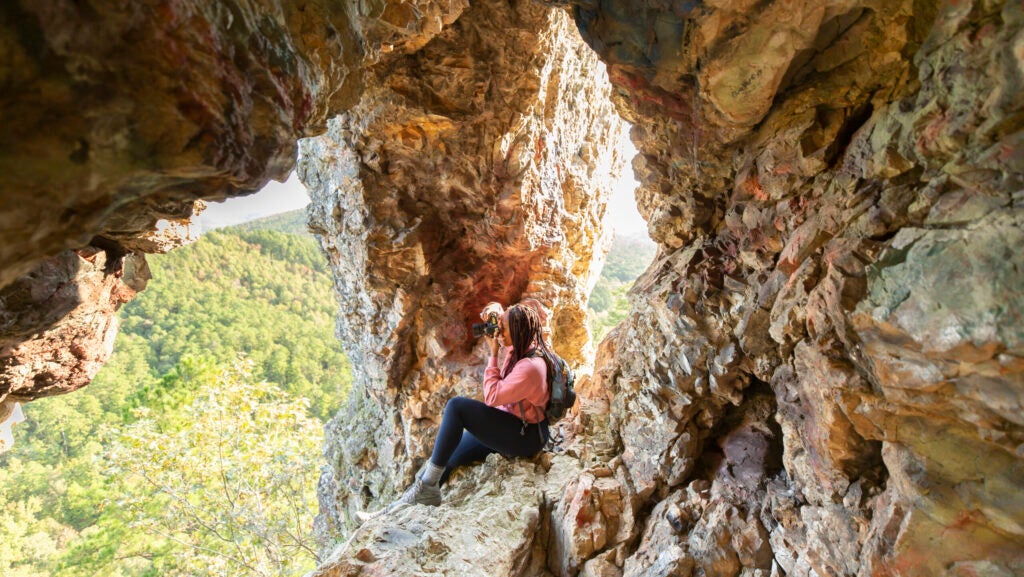No products in the cart.
Outdoor Adventure
8 Ways Arkansas Will Amaze You
When it comes to outdoor recreation, Arkansas is a hiking-biking-paddling-camping-
climbing paradise. The state is home to America’s first National River, world-class mountain biking trails, rocky crags, and almost 3 million acres of pristine national forest wilderness. Whatever adventures suit your fancy, Arkansas will keep you busy. The only problem? Where to start. We’re here to help with this rundown of eight of the best adventures to be had across the state.
1. Float the Buffalo National River
Experience a river in its most natural state on the Buffalo National River. As the first waterway to earn a national river designation, in 1972, it’s one of the few remaining undammed rivers in the contiguous United States. The free-flowing river is a mix of rapids and flatwater that paddlers of all levels can enjoy. While the river runs for 135 miles, most visitors stick to exploring sections of the Buffalo, which is divided into three districts. For mellow year-round floating, launch on a section of the Middle or Lower District. Or plan your trip between March and June, when rafters and kayakers can enjoy whitewater conditions along the Upper District.
Tip: Don’t miss Hemmed-In Hollow. At 210 feet, it’s the tallest waterfall between the Rockies and the Appalachians. From the river, catch the half-mile social trail about a mile downstream from Jim’s Bluff. Or park at the Compton Trailhead and hike the 5.7-mile out-and-back Hemmed-In Hollow Trail.
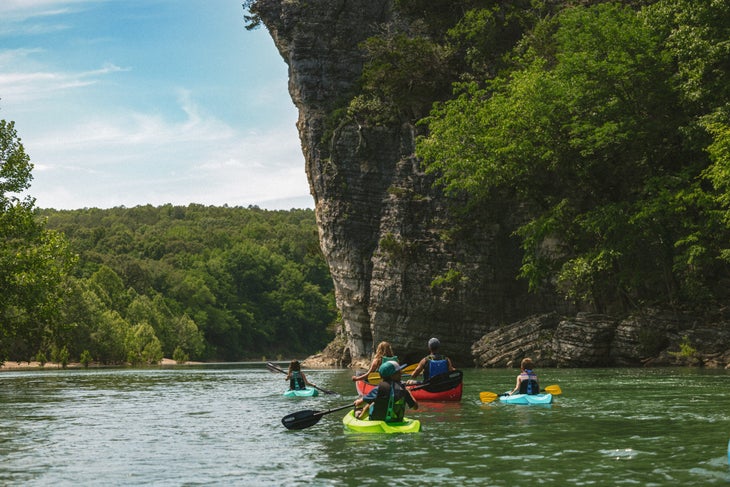
2. Mountain Bike the Back 40
In recent years, Arkansas has undergone a massive makeover, creating a world-class ecosystem of mountain biking trails, events, and culture. The Back 40 trail system in Blowing Springs is one of the places that started it all. Traverse ridgelines, challenge yourself with steep climbs, and pedal through some of northwest Arkansas’ most scenic areas, where you’ll encounter caves and waterfalls along 40 miles of trails.
Tip: Check out other great mountain biking trail systems across the state.
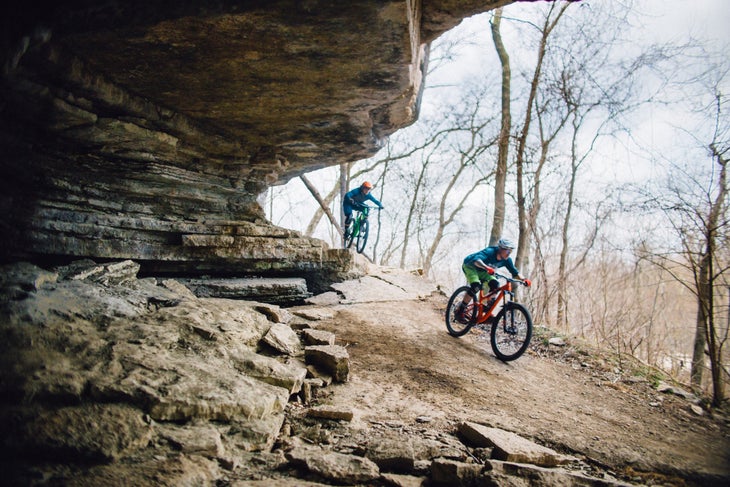
3. Go Rock Climbing at Sam’s Throne
With more than 300 named routes, Sam’s Throne Recreation Area could entertain any climber for years. There’s something for all types of climbers here, including boulders and some sport routes. But the crag is best known for its impressive lineup of trad climbs. Most routes fall in the 5.7 to 5.10 range, so there are plenty of options for beginner and intermediate climbers.
Tip: Looking for more sport routes? Try nearby Candy Mountain or Valley of the Blind. Both offer more bolted routes and are within a two-mile radius of Sam’s Throne.
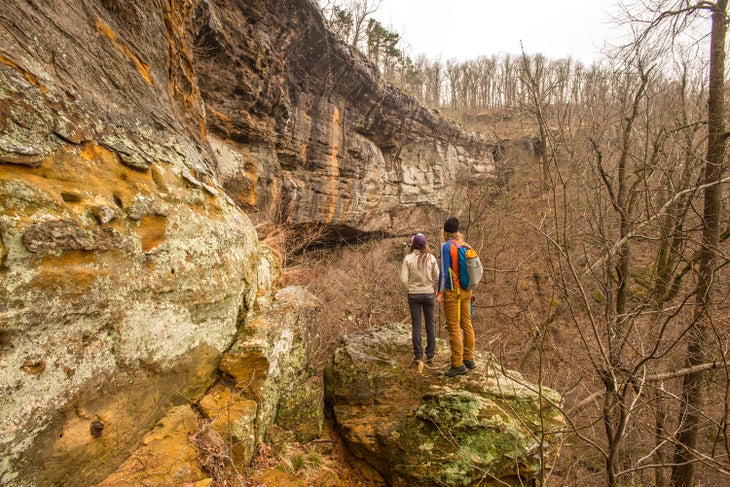
4. Hike to Hawksbill Crag for Stunning Views
Hike Whitaker Point Trail to check out Hawksbill Crag—one of the most iconic landmarks in the Ozark-St. Francis National Forest. The 2.7-mile trail winds through dense forest of pine and hardwood before popping out at the rocky outcropping that resembles its namesake. From there, hikers can take in expansive views of the Buffalo National River basin. The trail is accessible year-round but is especially scenic during peak fall colors (typically mid-October to early November).
Tip: Arrive early or go midweek for easier parking if you plan to visit this popular trailhead in the busy fall months.
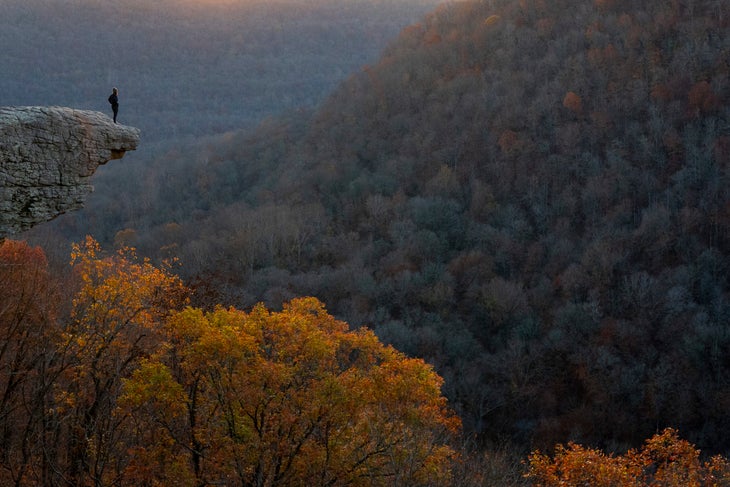
5. Run Class II/III Rapids on the Mulberry River
Whether you go on your own or with a guide, just go on a multiday river trip on the Mulberry River in the Ozark-St. Francis National Forest. The classic 40-mile run from Wolf Pen to Mill Creek is designated as a National Wild and Scenic River. In spring, the river lives up to its “wild” designation, with Class II/III rapids that charge through narrow canyons and tight turns. By early summer, when flows decrease, the river mellows to swimming-hole status. Whether you’re floating on the water or hanging on the river bank, keep an eye out for black bears. The dense Ozark forests are home to Arkansas’ highest bear concentration. Local outfitters offer guided multiday runs and day trips.
Tip: Anglers, pack your fishing rod. The river is an excellent fishery where you can try your luck at landing a variety of bass and sunfish, especially when water levels are high.
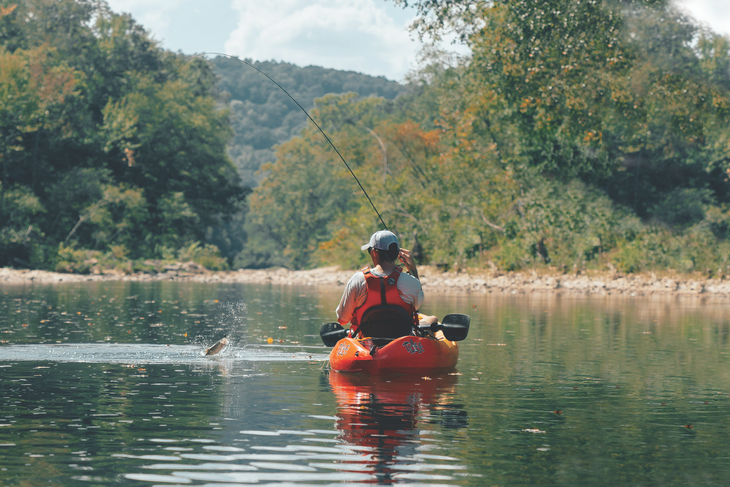
6. Or Take It Up a Notch with Class IV Rapids at Cossatot River
Looking to put your advanced paddling skills to the test? Head to the Cossatot River for Class IV rapids (and a whole lot of fun). Paddlers can run up to 26 miles on this National Wild and Scenic River, but the 12-mile stretch that runs through Cossatot River State Park is the most visited section—and for good reason. Here, expert paddlers can tackle the river’s crown jewel: Cossatot Falls, where the river roars through a tight, rocky canyon and drops 33 feet in one-third of a river mile. To catch peak whitewater season, plan your trip from late winter to early spring. Reach out to local outfitters for river beta and guided trips.
Tip: Not a paddler? No problem. While some parts of the river are accessible by boat only, hikers can enjoy nearly 20 miles of scenic trails that follow the river.
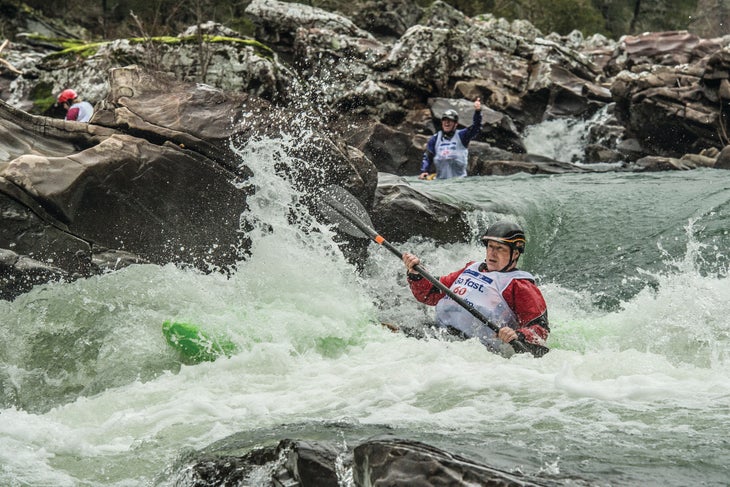
7. Explore Hidden Swimming Holes at the Richland Creek Wilderness Area
Venture deep into the heart of the Ozark-St. Francis National Forest to explore the Richland Creek Wilderness Area. If you’re willing to brave rough roads, this hard-to-reach slice of paradise will reward you well. The forest is brimming with more than 30 waterfalls and summertime swimming holes. There’s just one catch: you won’t find any developed trails to guide the way. Instead, explore a network of social trails and old logging roads to discover a private pool for an afternoon dip. Make the journey worth it by taking your overnight pack. Or stay a night or two at one of 11 primitive campsites in Richland Creek Recreation Area, the gateway to the nearby wilderness.
Tip: The rugged road to Richland Creek Wilderness Area isn’t for the faint of heart. Four-wheel-drive vehicles are recommended.
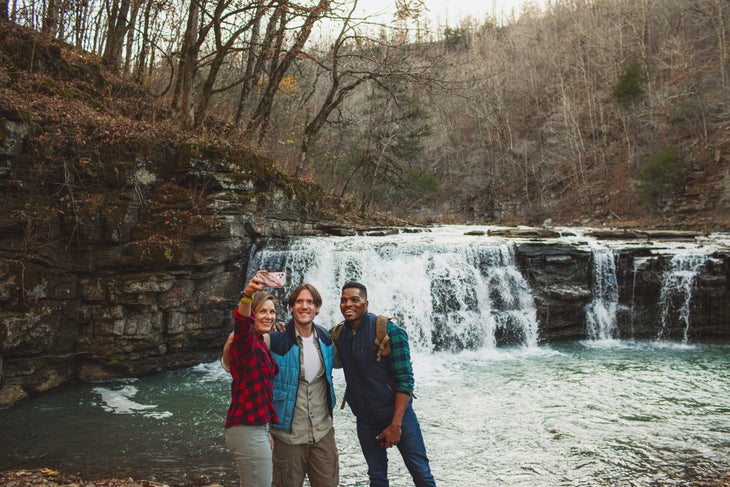
8. Hike the Little Missouri Trail to Window Rock
See another National Wild and Scenic River on foot when you hike the Little Missouri Trail in the Ouachita National Forest. Accessible year-round, the trail follows the river through impressive hardwood and old-growth pine forests and past cascades. Be prepared to get your feet wet: the 16-mile one-way trail includes 11 river and creek crossings. Don’t miss Window Rock—a cave perched about 400 feet above the river that offers sweeping views of the river framed by the cave walls. The .4-mile spur trail to this scenic outlook is near the Albert Pike Recreation Area at about mile 10 of the hike. Plan a day hike by dropping a car off at the end ahead of time to shuttle. Or tack on the Athens-Big Fork Trail and part of the Viles Branch Horse Trail for a multiday trip. Together, the three trails form the Eagle Rock Loop. At 29.2 miles, it’s the longest backpacking loop in the state.
Tip: Plan your trip to coincide with the solar eclipse on April 8, 2024. This section of the state will be in the path of totality for the celestial show.
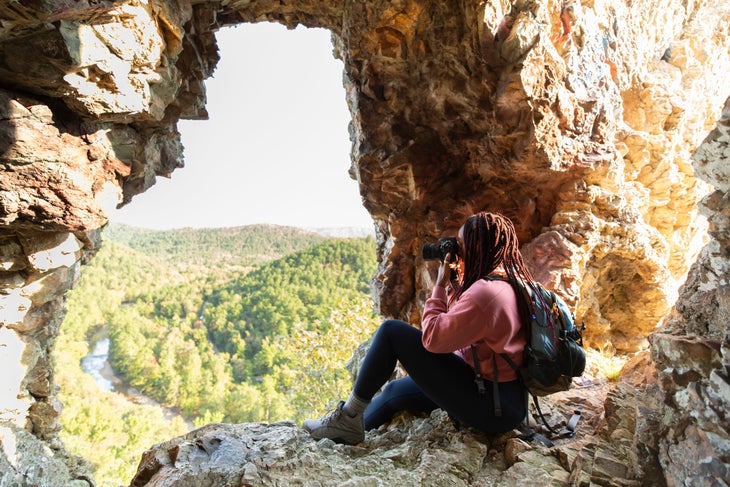
The Arkansas Department of Parks, Heritage, and Tourism protects and promotes the state’s natural, cultural, and historic assets, contributing to a thriving economy and high quality of life. The Division of Arkansas Tourism strives to expand the economic impact of travel and tourism in the state and enhance the quality of life for all Arkansans. The division manages 14 Arkansas Welcome Centers and employs more than 60 staff members across the Natural State. Learn more at arkansas.com.
Source link

